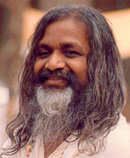
|
|
“What’s enlightenment?” — Q & A with Maharishi Mahesh Yogi The following interview with Maharishi Mahesh Yogi is an excerpt from Robert Oates’ Celebrating the Dawn, which was first published in 1976 by G.P. Putnam’s Sons, New York. Maharishi: “It’s only in the beginning days of meditation that one has to meditate in order to experience that silent, quiet level of the mind, that state of pure consciousness. As we continue to alternate the experience of the meditation with daily activity, the value of that pure consciousness is infused into the mind. The pure level of consciousness becomes stabilized in our awareness, and when that pure level—the state of least excitation—is a living reality even during daily activity, this is the state of enlightenment. This is life free from suffering, life when every thought and action is spontaneously correct. “And with the Transcendental Meditation Technique we have a natural and effective means to dissolve even deeply rooted fatigue and stress. This is the way to unfold full value of life. Even in the first days of meditation we find that our eyes seem to be a little more open, our mind seems a bit more clear. Our feeling towards our friends seems to be more harmonious. “And then, as the practice is continues every day, a time will come when we will start living life free from all stresses. We cleanse the awareness of all stresses and strains, leaving the conscious mind completely free in its pure value.” Maharishi: “Maintaining that pure awareness, that bliss consciousness, can be compared to having great wealth. If one is not aware of having great wealth in the bank, and one has only five dollars in the pocket, then there is some pinch about spending even one dollar for a rose. A man could say, ‘Ah, the rose is so beautiful, but now there are only four dollars left in the pocket.’ “There is some pinch to the feelings. But if the awareness is open to great wealth in the bank, a dollar is spent for a rose and the man is only faced with the joy of having a rose. No pinch is there. And this is one’s experience in the state of enlightenment. When that pure state of silence and bliss is stabilized on the level of one’s awareness, every activity is supported by that peace and joyfulness. Every activity is the expression of the fullness of life.” _________________________________________ From Celebrating the Dawn by Robert Oates Jr. Copyright © 1976 All rights reserved
|
|

